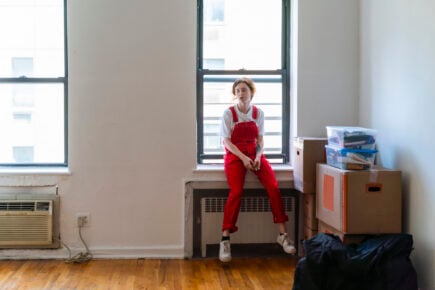What is ‘rentvesting’?
Rentvesting is where you buy an investment property while renting a different place to live.
Rentvesting is seen by young people as a viable way to enter a housing market that otherwise would not be available to them because the area they wish to live in is too expensive to buy into. With rentvesting, investors can have the benefits of both because the income from their property investment makes renting affordable in the suburb they prefer to live in.
Example of a rentvesting strategy
The common strategy behind rentvesting is to pay less in rent than you would with a mortgage and to use the money saved to invest in property elsewhere. Then, you can derive a rental income from that investment and hopefully experience capital growth in the same way you would if you owned the property you’re living in.
For example, if you were renting for $2000 a month and the mortgage on a similar property cost $4000 a month, you’d be using the $2000 difference on the investment property. Of course, that’s assuming you can save the difference and not just spend it — proper budgeting is the trick to successful rentvesting.
» MORE: Pay yourself first: reverse budgeting explained
Pros and cons of rentvesting
Much like the age-old debate regarding renting or buying, there is no shortage of advantages and disadvantages to rentvesting. Much of your decision will depend on where you want to live, how much you can afford to borrow to purchase the investment property and what you want to achieve from your investments over the short and long term.
Pros
- Lower-cost access to the market. Rentvesting gives you a foot in the door of the property market. This is because the investment property you’re acquiring should be much more affordable than what you’d pay to have your own home in your neighbourhood of choice. Once you start renting out the property, you can derive a passive income, which you can use to reinvest elsewhere or make higher repayments on your mortgage to build equity.
- Greater flexibility regarding where you live. Rentvesting lets you invest while still living in the neighbourhood of your choice, provided you can manage this financial arrangement. Remember, you should be able to use the income you derive from renting the property you purchased to pay down the mortgage. This gives you far greater flexibility to move around than if you are saddled with a long-term mortgage.
- Diversify risk and still accumulate wealth. The debt on your investment property should be less than if you had bought a home to live in. That means far fewer eggs in the one basket should something unfortunate occur that affects your ability to repay the loan. This means your risk is diversified, and you have more options if something unforeseen happens.
- Tax benefits. If your investment property is not making a profit from rental due to ongoing expenses and interest, you may be able to claim any losses as a tax deduction, otherwise known as negative gearing. With an investment property, it’s also possible to claim depreciation costs each year while you can also claim some initial costs such as stamp duty, though you would need to check with the ATO or a tax adviser regarding your situation.
Cons
- Investor loans may be more expensive. Investor home loans generally come with a higher interest rate than owner-occupier mortgages so it’s best to shop around and see what the most competitive interest rates for investors are.
- No grant payments. Depending on where you live, you may not be eligible for any First Home Owner Grant schemes or other initiatives designed to help young people become homeowners because you usually have to live in the property you buy for at least six months, if not a year, before you are eligible.
- Unreliable tenants. Using your rental income effectively is essential for rentvesting to work, but this also means you are at the whim of tenants for your cash flow. They might turn out to be disastrous and never pay the rent, or you could go for an extended period without a tenant. Before you go down the rentvesting path, you should be sure that the area you’re buying into is relatively reliable regarding tenants, though that’s still no guarantee.
- Landlord expenses. As a landlord, you are now the one responsible for maintenance, rates, fees and levies, all of which will eat into your bottom line, the extent to which will largely depend on the state of the property.
- Capital gains tax. The taxman giveth and the taxman taketh away. While you get some negative gearing concessions, you will usually have to pay capital gains tax on any profit you make when selling the property unless it is deemed to be your principal place of residence. If you have previously lived in the property, you may be entitled to an exemption known as the capital gains tax six-year rule.
Is rentvesting a good idea for you?
Rentvesting is to many a happy compromise between buying and renting where you can do both — build an asset and still get to live where you want to. But is it the right long-term investment strategy for you? That will depend on a number of factors such as where you buy and rent, the reliability of your tenants as a source of income and your ability to service a property loan on top of your own rental commitments.
Before you make a decision, it’s always a good idea to talk to a mortgage broker and a financial planner. They can crunch some numbers with you and help you arrive at a conclusion.
DIVE EVEN DEEPER

How to Save for a House Deposit
How you save for a deposit and how long it takes you will be a good indicator not only of how well you manage your finances but how much you can realistically afford in regular mortgage repayments.

How ‘Rent To Own’ Home Schemes Work
Rent-to-own schemes are advertised as an easy way to get into the property market, but the risks may not be worth the benefits.

Renting vs Buying in Australia: Which Is Best?
If deciding between renting vs buying in Australia, the best option weighs up the state of the market and your financial circumstances.

Mortgage Glossary and Home Loan Terminology
Confused by mortgage jargon? This glossary of home loan terminology includes words and phrases first-time buyers are likely to encounter in Australia.

